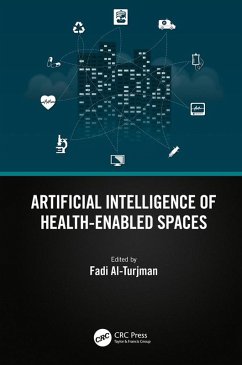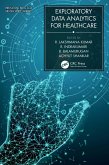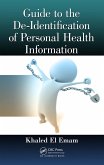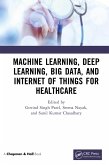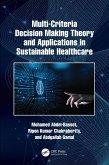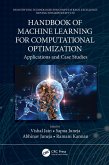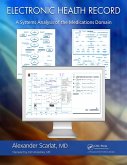Artificial Intelligence of Health-Enabled Spaces (eBook, PDF)
Redaktion: Al-Turjman, Fadi
48,95 €
48,95 €
inkl. MwSt.
Sofort per Download lieferbar

24 °P sammeln
48,95 €
Als Download kaufen

48,95 €
inkl. MwSt.
Sofort per Download lieferbar

24 °P sammeln
Jetzt verschenken
Alle Infos zum eBook verschenken
48,95 €
inkl. MwSt.
Sofort per Download lieferbar
Alle Infos zum eBook verschenken

24 °P sammeln
Artificial Intelligence of Health-Enabled Spaces (eBook, PDF)
Redaktion: Al-Turjman, Fadi
- Format: PDF
- Merkliste
- Auf die Merkliste
- Bewerten Bewerten
- Teilen
- Produkt teilen
- Produkterinnerung
- Produkterinnerung

Bitte loggen Sie sich zunächst in Ihr Kundenkonto ein oder registrieren Sie sich bei
bücher.de, um das eBook-Abo tolino select nutzen zu können.
Hier können Sie sich einloggen
Hier können Sie sich einloggen
Sie sind bereits eingeloggt. Klicken Sie auf 2. tolino select Abo, um fortzufahren.

Bitte loggen Sie sich zunächst in Ihr Kundenkonto ein oder registrieren Sie sich bei bücher.de, um das eBook-Abo tolino select nutzen zu können.
This book is dedicated to addressing the major challenges in fighting diseases and psychological issues using AI. Challenges vary from cost and complexity to availability and accuracy. The aim of this book is hence to focus on both the design and implementation aspects of the AI-based approaches in proposed health-related solutions.
- Geräte: PC
- mit Kopierschutz
- eBook Hilfe
Andere Kunden interessierten sich auch für
![Exploratory Data Analytics for Healthcare (eBook, PDF) Exploratory Data Analytics for Healthcare (eBook, PDF)]() Exploratory Data Analytics for Healthcare (eBook, PDF)51,95 €
Exploratory Data Analytics for Healthcare (eBook, PDF)51,95 €![Guide to the De-Identification of Personal Health Information (eBook, PDF) Guide to the De-Identification of Personal Health Information (eBook, PDF)]() Khaled El EmamGuide to the De-Identification of Personal Health Information (eBook, PDF)44,95 €
Khaled El EmamGuide to the De-Identification of Personal Health Information (eBook, PDF)44,95 €![Machine Learning, Deep Learning, Big Data, and Internet of Things for Healthcare (eBook, PDF) Machine Learning, Deep Learning, Big Data, and Internet of Things for Healthcare (eBook, PDF)]() Machine Learning, Deep Learning, Big Data, and Internet of Things for Healthcare (eBook, PDF)46,95 €
Machine Learning, Deep Learning, Big Data, and Internet of Things for Healthcare (eBook, PDF)46,95 €![Multi-Criteria Decision Making Theory and Applications in Sustainable Healthcare (eBook, PDF) Multi-Criteria Decision Making Theory and Applications in Sustainable Healthcare (eBook, PDF)]() Mohamed Abdel-BassetMulti-Criteria Decision Making Theory and Applications in Sustainable Healthcare (eBook, PDF)51,95 €
Mohamed Abdel-BassetMulti-Criteria Decision Making Theory and Applications in Sustainable Healthcare (eBook, PDF)51,95 €![Handbook of Machine Learning for Computational Optimization (eBook, PDF) Handbook of Machine Learning for Computational Optimization (eBook, PDF)]() Handbook of Machine Learning for Computational Optimization (eBook, PDF)64,95 €
Handbook of Machine Learning for Computational Optimization (eBook, PDF)64,95 €![Electronic Health Record (eBook, PDF) Electronic Health Record (eBook, PDF)]() MD Alexander ScarlatElectronic Health Record (eBook, PDF)125,95 €
MD Alexander ScarlatElectronic Health Record (eBook, PDF)125,95 €![Data Protection and Privacy in Healthcare (eBook, PDF) Data Protection and Privacy in Healthcare (eBook, PDF)]() Data Protection and Privacy in Healthcare (eBook, PDF)60,95 €
Data Protection and Privacy in Healthcare (eBook, PDF)60,95 €-
-
-
This book is dedicated to addressing the major challenges in fighting diseases and psychological issues using AI. Challenges vary from cost and complexity to availability and accuracy. The aim of this book is hence to focus on both the design and implementation aspects of the AI-based approaches in proposed health-related solutions.
Dieser Download kann aus rechtlichen Gründen nur mit Rechnungsadresse in A, B, BG, CY, CZ, D, DK, EW, E, FIN, F, GR, HR, H, IRL, I, LT, L, LR, M, NL, PL, P, R, S, SLO, SK ausgeliefert werden.
Produktdetails
- Produktdetails
- Verlag: Taylor & Francis eBooks
- Seitenzahl: 202
- Erscheinungstermin: 16. Juni 2023
- Englisch
- ISBN-13: 9781000893120
- Artikelnr.: 67806076
- Verlag: Taylor & Francis eBooks
- Seitenzahl: 202
- Erscheinungstermin: 16. Juni 2023
- Englisch
- ISBN-13: 9781000893120
- Artikelnr.: 67806076
- Herstellerkennzeichnung Die Herstellerinformationen sind derzeit nicht verfügbar.
Prof. Dr. Fadi Al-Turjman received his Ph.D. in computer science from Queen's University, Canada, in 2011. He is the associate dean for research and the founding director of the International Research Center for AI and IoT at Near East University, Nicosia, Cyprus. Prof. Al-Turjman is the head of Artificial Intelligence Engineering Dept., and a leading authority in the areas of smart/intelligent IoT systems, wireless, and mobile networks' architectures, protocols, deployments, and performance evaluation in Artificial Intelligence of Things (AIoT). His publication history spans over 400 SCI/E publications, in addition to numerous keynotes and plenary talks at flagship venues. He has authored and edited more than 40 books about cognition, security, and wireless sensor networks' deployments in smart IoT environments, which have been published by well-reputed publishers such as Taylor and Francis, Elsevier, IET, and Springer. He has received several recognitions and best papers' awards at top international conferences. He also received the prestigious Best Research Paper Award from Elsevier Computer Communications Journal for the period 2015-2018, in addition to the Top Researcher Award for 2018 at Antalya Bilim University, Turkey. Prof. Al-Turjman has led a number of international symposia and workshops in flagship communication society conferences. Currently, he serves as book series editor and the lead guest/associate editor for several top tier journals, including the IEEE Communications Surveys and Tutorials (IF 23.9) and the Elsevier Sustainable Cities and Society (IF 7.58), in addition to organizing international conferences and symposiums on the most up to date research topics in AI and IoT.
About the Editor. List of Contributors. Chapter 1 IoT and Machine
Learning-Based Smart Healthcare System for Monitoring Patients. Chapter 2
Detection and Diagnosis of COVID- 19 from Chest X-Ray Images Using Deep
Learning. Chapter 3 Analysing the Stages of Diabetic Retinopathy Using Deep
Learning Techniques. Chapter 4 COVID-19 Detection Based on Deep Learning
Feature Extraction and AdaBoost Ensemble Classifier. Chapter 5 Deep
Learning and Transfer Learning Models for Detection of COVID-19. Chapter 6
Industry 4.0 Challenges and Applications in the Healthcare Industry with
Emerging Technologies. Chapter 7 Cyber-Security Countermeasures and
Vulnerabilities to Prevent Social-Engineering Attacks. Chapter 8
Development of a COVID-19 Tracking System. Chapter 9 An Overview of
Autonomous Perception for a Robotic Arm. Chapter 10 Artificial
Intelligence-Based Methods for SARS-CoV-2 Detection with CRISPR Systems.
INDEX.
Learning-Based Smart Healthcare System for Monitoring Patients. Chapter 2
Detection and Diagnosis of COVID- 19 from Chest X-Ray Images Using Deep
Learning. Chapter 3 Analysing the Stages of Diabetic Retinopathy Using Deep
Learning Techniques. Chapter 4 COVID-19 Detection Based on Deep Learning
Feature Extraction and AdaBoost Ensemble Classifier. Chapter 5 Deep
Learning and Transfer Learning Models for Detection of COVID-19. Chapter 6
Industry 4.0 Challenges and Applications in the Healthcare Industry with
Emerging Technologies. Chapter 7 Cyber-Security Countermeasures and
Vulnerabilities to Prevent Social-Engineering Attacks. Chapter 8
Development of a COVID-19 Tracking System. Chapter 9 An Overview of
Autonomous Perception for a Robotic Arm. Chapter 10 Artificial
Intelligence-Based Methods for SARS-CoV-2 Detection with CRISPR Systems.
INDEX.
About the Editor. List of Contributors. Chapter 1 IoT and Machine
Learning-Based Smart Healthcare System for Monitoring Patients. Chapter 2
Detection and Diagnosis of COVID- 19 from Chest X-Ray Images Using Deep
Learning. Chapter 3 Analysing the Stages of Diabetic Retinopathy Using Deep
Learning Techniques. Chapter 4 COVID-19 Detection Based on Deep Learning
Feature Extraction and AdaBoost Ensemble Classifier. Chapter 5 Deep
Learning and Transfer Learning Models for Detection of COVID-19. Chapter 6
Industry 4.0 Challenges and Applications in the Healthcare Industry with
Emerging Technologies. Chapter 7 Cyber-Security Countermeasures and
Vulnerabilities to Prevent Social-Engineering Attacks. Chapter 8
Development of a COVID-19 Tracking System. Chapter 9 An Overview of
Autonomous Perception for a Robotic Arm. Chapter 10 Artificial
Intelligence-Based Methods for SARS-CoV-2 Detection with CRISPR Systems.
INDEX.
Learning-Based Smart Healthcare System for Monitoring Patients. Chapter 2
Detection and Diagnosis of COVID- 19 from Chest X-Ray Images Using Deep
Learning. Chapter 3 Analysing the Stages of Diabetic Retinopathy Using Deep
Learning Techniques. Chapter 4 COVID-19 Detection Based on Deep Learning
Feature Extraction and AdaBoost Ensemble Classifier. Chapter 5 Deep
Learning and Transfer Learning Models for Detection of COVID-19. Chapter 6
Industry 4.0 Challenges and Applications in the Healthcare Industry with
Emerging Technologies. Chapter 7 Cyber-Security Countermeasures and
Vulnerabilities to Prevent Social-Engineering Attacks. Chapter 8
Development of a COVID-19 Tracking System. Chapter 9 An Overview of
Autonomous Perception for a Robotic Arm. Chapter 10 Artificial
Intelligence-Based Methods for SARS-CoV-2 Detection with CRISPR Systems.
INDEX.
